Biography
Mayakovsky in the poem said:"Eat pineapples, Flames, your last day comes, bourgeois."The dominant idea of equality and proletariat on the expanses of the Soviet space was created by revolutionary under the influence of the work of recognized German public figures - Friedrich Engels and Karl Marx. Let their teaching and was utopian, as shown by the sad example of the USSR, but these people left the mark in history, philosophy and economics.
Childhood and youth
The founder of Marxism was born the firstborn (9 children grew in the house) on November 28, 1820 in the town of Bartender, who today is the administrative district of the city of Wuppertal (North Rhine-Westphalia, Germany). The future politician was brought up in the family of a producer of a cotton fabric Fritrich Engels, which came from a noble dynasty founded in the city of Bergish-gladbach in the 16th century, and was distinguished by conservative views on life.
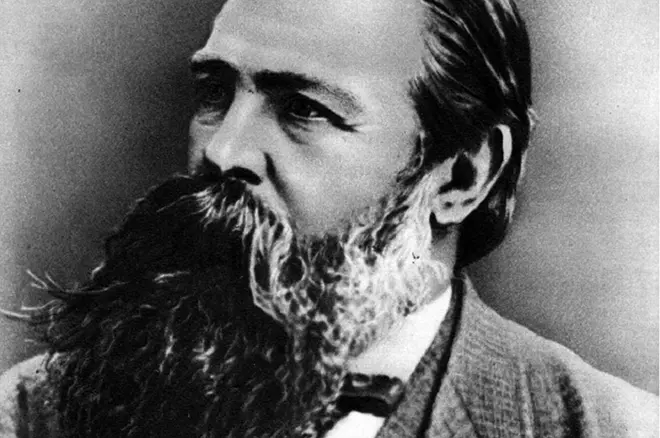
The mother of the revolutionary Elizabeth Engels (Haar) came out from the environment of respected philologists, was a female sensitive, radiant, educated and talented. On his older son, Elizabeth had an exceptionally positive effect. Engels-Sr. was a believer, like his parents, was leaning towards chietism, which arose from the teachings of Lutherhood. The chiefists were not supporters of the dogmas revered by Lutherans, but they encouraged living chat with God and personal piety. Friedrich Jr., grew in a religious atmosphere, adopted a Protestant confession that reigned in the house.
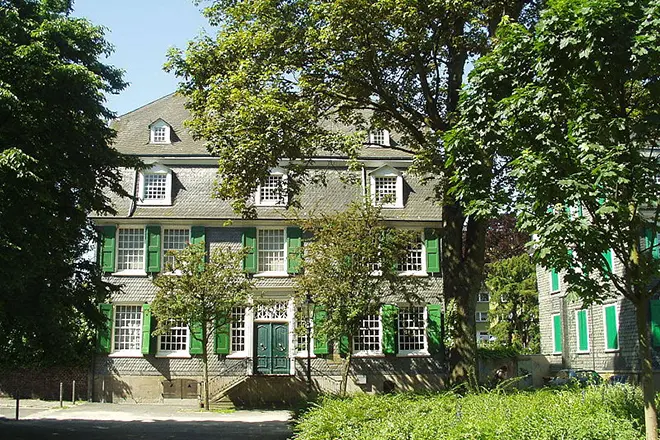
But when Engels became older, he began to reject the faith in every way to the existence of Gods: athetic inclinations were progressed every year. It all started after the young man met the creations of David Strauss - publicist and a theologist. After reading his key work "Life of Jesus", Engels thoroughly began to doubt the idea of personal faith. In the future, the "worry" Friedrich became a stumbling block between the Father and the Son.
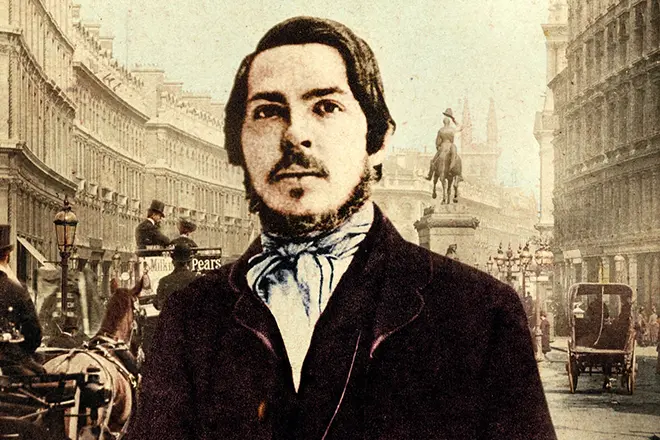
The future policy has a warm relationship with the grandfather of the maternal line Gerhard Bernhard Van Haar, a philologist for education, which at one time was at a high-ranking position of the rector. Gerhard introduced the grandson with the bright and diverse world of literature, especially with ancient Greek epic. The boy was enthusiastic "Ilia" Homer, where the brave Meneli entered into confrontation with her hand and Heart of Elena. The young Friedrich fascinated the stories about the ruthless Trojan war, in which the legendary heroes participated, fought not for life, but to death.
Engels began to attend a general educational institution in his native bartender, where Corpel over textbooks in physics and chemistry, and also showed his abilities to knowledge of languages. Later, Friedrich became a student of the Gymnasium Elberfeld. In the autumn of 1837, the young man was forced to leave the school bench at the insistence of his father, who wanted the offspring to go to his footsteps and tied life with family business.
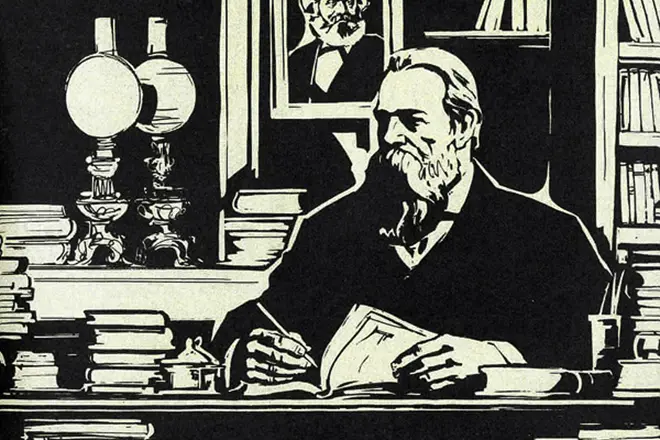
Friedrich dreamed of getting a tribute university education, but could not disobey the will of his parent, so he began to work out in Engels-senior, having no tendency to entrepreneurship. If the guy had a choice between business and writing, then he, of course, would give preference to the latter. Friedrich Jr. dreamed of literature and poetry, perhaps Engels would become the second Goethe or Schiller, but fate made its adjustments. Although in the 1838th Engels, after all, became the author of ballads called "Bedouins".
In August 1838, Friedrich, without interrupting the head of the family, continued to study at the trade worker in the city of Bremen, which in the north-west of Germany. As a student, Engels earned minor money, working as a corresponding: a young man wrote provocative notes on the problems of industrialization in the Stuttgart Morning Newspaper and the "Augsburg General Newspaper" under the pseudonym Oswald. Friedrich did not want the readers to know that he was a leaving from the capitalist family.
Free from study and work time The future philosopher spent with benefit: he read out by classical literature, tried to musitize, composed poems and wrote critical essays. In addition, Engels was a zealous fan of sports: he was engaged in swimming and horse riding. Friedrich was carried away by the works of the founder of Christian mysticism and Sophiology of Jacob Beme, but this addiction was short-lived.
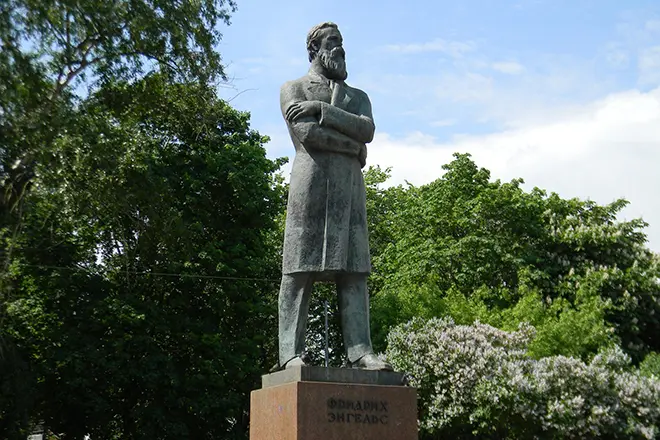
Further, the Favorite of Engels became a theologist and preacher Schleiermakhiver, who was an adherent eclecticism and denied the invasion of metaphysics into religion. Then Friedrich began to study the manuscript dominated by the German philosopher Georg Hegel, who reflected on the phenomenology of the Spirit, as well as about religion, right, history and art.
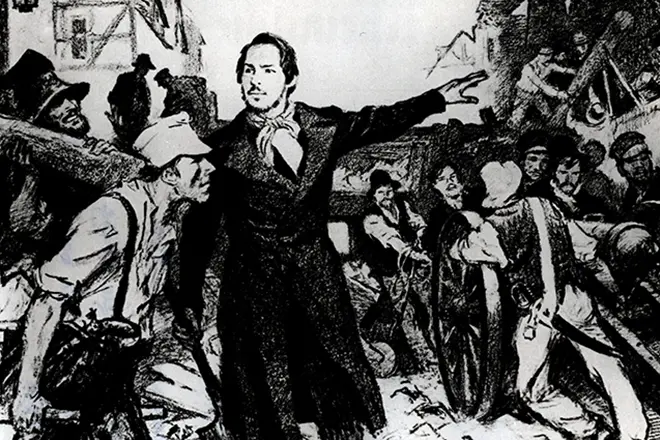
In 1841, Engels reached a call age and headed for the service to the army in Berlin, where he became a scorer in an artillery brigade. Frederick not only performed military duty, but also attended the capital University, where he went to lectures on philosophy as a fully luster, and also joined the group of left hegelians who praised the dialectics of George, but did not take it conservatism. Friedrich was a golden middle between the left and right, because he defended Hegel from the shelling attacks.
Marxism
Engels and Marx acquaintance happened in 1842. Two ingenious people met in Cologne, in the editorial office of the Rhine newspaper. Initially, Friedrich did not cause sympathy from Marx, because the philosopher considered Engels to adherent to the youngergolas, with whom he had disagreements. Further, Engels road followed in Manchester, where he studied the Azam of the Father's textile enterprise. In the largest city of North-West England, the future Marxist stayed for almost two years. In the picturesque areas of the United Kingdom, Engels met the life and life of the average working people, and this had a tremendous impact on his subsequent worldview.
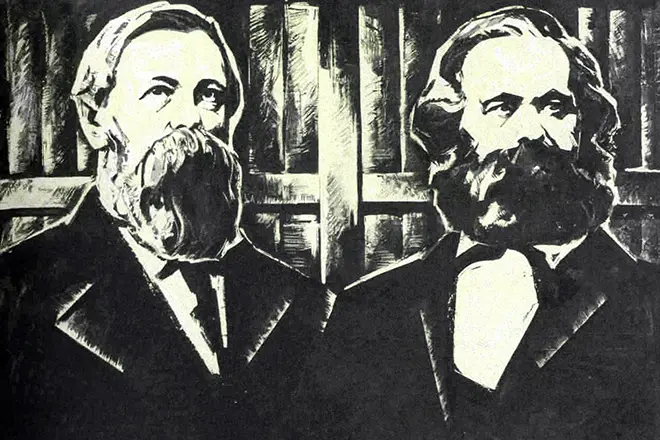
In 1843, Friedrich enters into the ranks of the German revolutionaries, with whom he met in London. At that time, Engels continued to work as a journalist, sending his work, where the arguments of communism flashed, in multiple newspapers, including the German-French Yearbook, which was published by Marx and his friend of Ruga in Paris. A correspondence began between future comrades, warm and friendly relations began to grow, they often met and discussed common philosophical ideas.
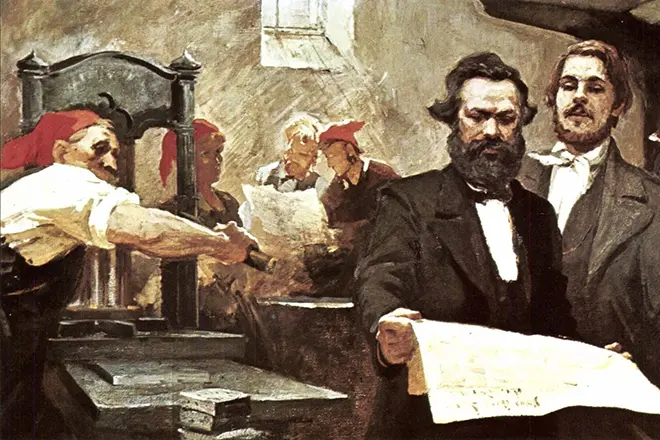
In 1845, Engels returns to his homeland and is adopted for writing the scientific work "The position of the working class in England". At the same time, the disagreements of Friedrich with the Father began. Engels-Sr. absolutely did not understand the activities of the Son. The businessman of a wide hand did not share the philosophy of the ideas of antagonism of the proletariat and the bourgeoisie, which his sibling was so fond. Frederick not only began to reject all the manifestations of religion, but also borrowed problems with the police, which spoiled the reputation of a large textile.
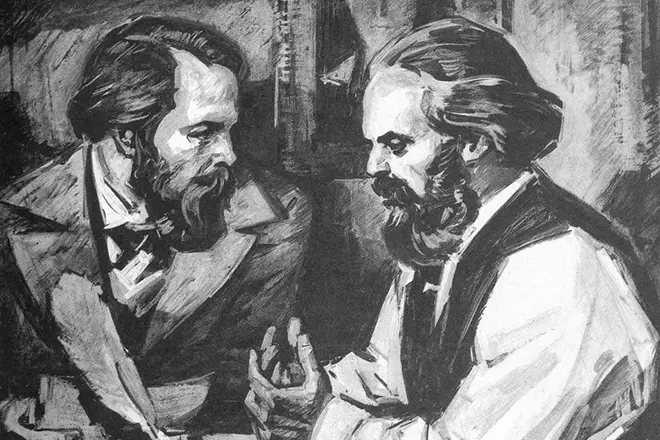
The fact is that a friend of Karl Marx did not hesitate to express his views and discuss the communism in public. Therefore, the guardians of law enforcement set themselves next to a young speaker. It is not surprising that Marx also began to be straightened, however, with French law. Ultimately, both public figures moved to the relatively free capital of Belgium Brussels. Then in 1845, the colleagues returned to England, where in 2 years they received a ticket "Union fair", left-handed organization.
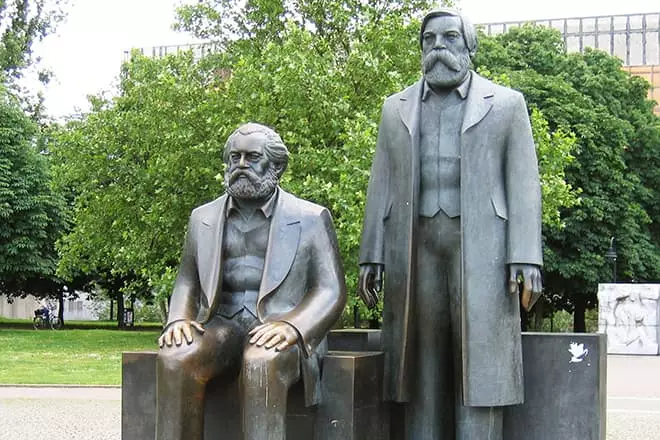
After the adoption of Marx and Engels in their ranks, this circle for interests was replaced by the name on the "Union of Communists". Later, the association was abolished after the trial of eleven participants in Cologne. In winter, a year later, the philosophers returned to Brussels, where they became the founders of a virtual instrument called "Communist Correspondent Committee", which was intended for postal connection between supporters of socialism.
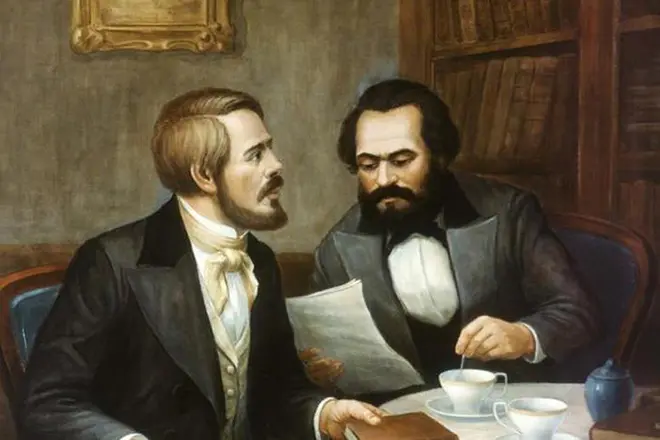
From November 1845, young geniuses began to work on a two-volume "German ideology", which became the key arch of the Marx and Engels philosophy. However, the authors could not find the publisher, so the valuable book was published only in 1932 in Moscow edited by Social Democrat David Borisovich Ryazanov. Although most accustomed to perceive Engels as a shadow and the second violin of Karl Marx, Friedrich made an integral contribution to the basis of a materialistic understanding of history. Lenin said:
"It is impossible to understand Marxism and it is impossible to solicit it, not believing with all the writings of Engels."Marx and Engels shared the overall theory of the proletariat, and also substantiated the need to create a revolutionary party. It should be assumed that separately these great minds would not achieve due glory. In recent years, Engels has been an active fighter for the rights of working classes, in its work "Capitalism" the philosopher noted a subtle face of the emerging imperialism. In the "Manifesto of the Communist Party", Engels and Marx considered the anti-capitalist revolution as the only way, blurring the border between the proletariat and the bourgeoisie.
Personal life
Frederick Engels was a highly educated intelligent and an erudite interlocutor. The philosopher owned eight languages: he could express in Russian, Portuguese, Irish and other languages. The revolutionary often arranged parties for London's associates who were held on Sunday evenings. These friendly gatherings often ended in 2 or 3 hours at night.
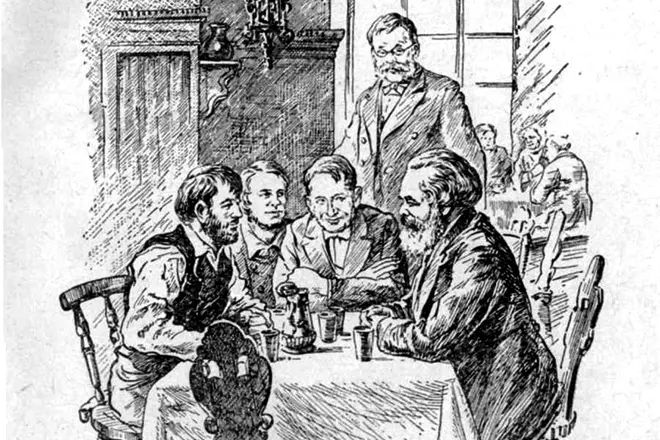
One day Jenny Long (Karl Marx's daughter) Dala Friedrich fill out a questionnaire - this questionnaire enjoyed unprecedented popular among girls at school. Engels answered a couple of typical questions. Thus, biographers found out that the Socialist disliked the theologian Charles Scheden, but read Shakespeare, Goethe and Lessing. In people, the philosopher loved the cheerful character, hated hypocrisy and the arrogant young lady. It is also known that the public figure belonged to everything in life easily, but, like any death, was afraid of dentists. In addition to other things, Engels adored Chateau Margo 1848 spill, Irish stew for dinner and fox hunting.
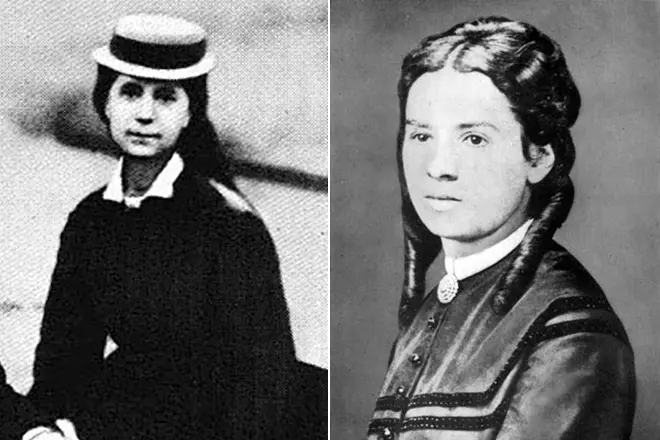
As for love relationships, Mary's Chief and her sister Lizzy Burns Friedrich met at about 1843. Engels did not like to do his life to the public, so about the fate of his beloved information is extremely scary. It is known that Mary was a daughter of a dyeer in a textile factory and separated the socialist ideas of his recycle. Also, by rumors, Mary did not give up hot drinks, later her passion for alcohol turned into alcoholism.
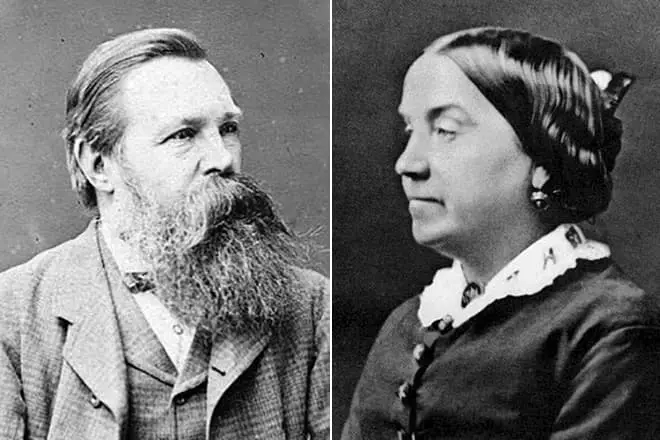
Some scientists converge to the fact that the harmful habit was the cause of her unexpected death. In 1863, a few hours before the death of Mary Friedrich, the opponent of marriages, legalized his relationship with the dying Miss Burns. After the death of his wife, Engels began relationships with her sister - Lydia, a small, but intelligent woman who was known as Lizzy. In 1878, Lizzy got sick and flew into bed. The woman could not recover and soon died. Although Engels was an atheist, he respected the religious feelings of his beloved, so he also signed with her on her deathbed.
Death
On August 5, 1895, the Grand Revolutionary died. The cause of death is the esophagus cancer. The body of the philosopher is cremated. Urn with dust was lowered into the sea on the coast of La Mansha.In honor of Marx and Engels, streets are named in some cities of Russia, as well as monuments. In 1985, the State Bank of the Soviet Union released the anniversary coin depicting Friedrich.
Bibliography
- 1845 - "The position of the working class in England"
- 1848 - "Manifesto Communist Party"
- 1878 - "Anti-Dühring"
- 1883 - "Dialectics of Nature"
- 1884 - "The origin of the family, private property and the state"
- 1886 - "Ludwig Feyerbach and the end of the classical German philosophy"
